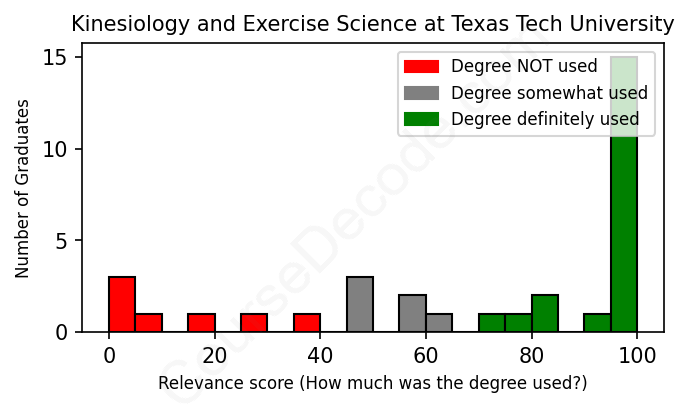
First, some facts. Of the Kinesiology and Exercise Science graduates from Texas Tech University we've analyzed , here's how many have used (or NOT used) their degree in their career:

These are estimates based on AI analysis of 33 LinkedIn profiles (see below).
The verdict? Slightly above average. Overall, with an average relevance score of 70%, Kinesiology and Exercise Science graduates from Texas Tech University have a slightly higher likelihood (+3%) of finding work in this field compared to the average graduate across all fields:
And for comparison, here's the chart for all profiles we've looked at across all degrees.
Also, after graduating, 57% of these graduates have pursued further education other than another Bachelor's degree (such as a Masters degree or other), compared to the average across all profiles of 35%. This suggests you may need more than just a Bachelors degree to be competitive as a Kinesiology and Exercise Science graduate.
See the details:
|
Relevance score: 100% We think this person has gone into a career highly relevant to their degree. We think this person has gone into a career highly relevant to their degree.
DEGREE INFOGraduated in 2023 from Texas Tech University with a Bachelor of Science - BS in Kinesiology and Exercise Science. Also pursued further education since (see below). JOB HISTORY SINCE GRADUATIONPhysical Therapy Technician The Carrell Clinic May 2023 - Aug 2023 Strength & Conditioning Intern  Bishop Lynch High School Jan 2024 - Apr 2024 Physical Therapy Technician  The Carrell Clinic Jan 2024 - Apr 2024 FURTHER DEGREES DONE SINCE GRADUATINGDoctorate of Physical TherapyTexas Tech University Health Sciences Center 2024 - 2027 ABOUTNo information provided. |
The top 10 most common jobs done by the graduates we've analyzed (ranked most common to least) are:
After looking through all these LinkedIn profiles, it seems like people who graduated with a degree in Kinesiology and Exercise Science from Texas Tech University have landed a variety of jobs. The most common roles they’ve taken up are definitely in the sports and health industries, such as professional athletes, physical therapists, and coaches. Many of them have gone on to work as physical therapy technicians, rehabilitation specialists, exercise physiologists, or in teaching roles like physical education teachers. These jobs tend to use the skills and knowledge gained from their degree in a pretty direct way, especially when it comes to understanding human movement, physical rehabilitation, and exercise programming.
That said, not all positions are related to Kinesiology and Exercise Science. Some graduates have found themselves in roles that have little to do with their field, like managers in restaurants or customer service roles. Even when they do relate to health, like in sales or marketing, the connection isn't strong enough to really say they’re using their degree effectively. Overall, it’s clear that while many Kinesiology graduates are thriving in relevant positions that utilize their expertise, a fair number are drifting into non-related careers where their knowledge isn’t a significant factor.
Here is a visual representation of the most common words in job titles for Kinesiology and Exercise Science graduates (this is across all Kinesiology and Exercise Science graduates we've analyzed, not just those who went to Texas Tech University):

So, it looks like graduates from Texas Tech University with a degree in Kinesiology and Exercise Science have pretty diverse career paths, but many still find their way back to fields related to health, fitness, and sports. For many, the first jobs after graduation often include positions like physical therapy technicians, rehab techs, or even coaching roles—things that closely link back to their studies in Kinesiology. It’s not uncommon to see fresh grads starting out in entry-level roles that still keep them in the game, so to speak, which is a solid reflection of their training.
As we look five or even ten years down the line, the picture starts to get a bit varied. Some folks stick with their original path and advance to roles like physical therapists, physicians' assistants, or athletic trainers, which are definitely aligned with Kinesiology. Others seem to drift into tangential fields, taking on jobs that might not directly relate to their degree, like sales or management positions. However, many graduates do land rewarding careers tied back to their education, especially if they pursue further certifications or advanced degrees. All in all, it's a mix, but there’s a fair number of people making their degrees work for them in meaningful ways in the health and fitness industry!
Honestly, a Bachelor’s degree in Kinesiology and Exercise Science tends to be on the more manageable side compared to some other majors. At Texas Tech University, you can expect a good mix of classes that cover anatomy, physiology, biomechanics, and exercise programming. While there’s definitely some tough material, especially when you dive into hands-on labs and projects, if you're passionate about sports and fitness, it can feel a lot more engaging than, say, a hardcore engineering or math degree. Like with any college program, it requires effort and commitment, but if you stay organized and have a genuine interest in the subject, it shouldn't be the most grueling experience out there.
Most commonly, in the LinkedIn profiles we've looked at, it takes people 4 years to finish a Bachelor degree in Kinesiology and Exercise Science.
Looking at the career paths of these Texas Tech kinesiology and exercise science grads, it seems like there’s a mixed bag when it comes to how much money they've been making. Some of them hit the jackpot early on, like the NFL player who was likely making a hefty salary during his short stint in the league. Others, like the various teachers and coaches, probably aren’t rolling in it since those jobs usually pay less. Meanwhile, folks who went into more specialized roles in healthcare or engineering, like physical therapists and physician assistants, tend to enjoy better salaries as they gain experience. Overall, while some are likely doing well financially, others are probably still working their way up the ladder, so it really just depends on the individual path they chose!
Here is a visual representation of the most common words seen in the "about" section of LinkedIn profiles who have a Bachelor degree in Kinesiology and Exercise Science (this is across all Kinesiology and Exercise Science graduates we've analyzed, not just those who went to Texas Tech University). This may or may not be useful:

Here are all colleges offering a Bachelor degree in Kinesiology and Exercise Science (ordered by the average relevance score of their Kinesiology and Exercise Science graduates, best to worst) where we have analyzed at least 10 of their graduates: